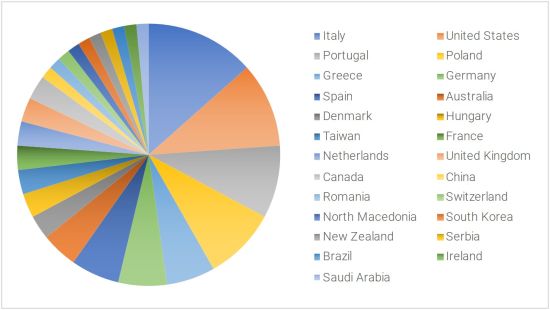Search Articles
Journal:
all
Keyword:
building sustainability
Total
—
46 articles
Article 2 May 2024
Michael Benson
2749 Views1203 Downloads
Review 18 Apr 2024
Md Tasbirul Islam, Usha Iyer-Raniga and Amjad Ali
Highlights of Sustainability
Volume 3 (2024), Issue 2, pp. 129–162
Volume 3 (2024), Issue 2, pp. 129–162
8302 Views1098 Downloads5 Citations
Article 26 Mar 2024
Clint T. Lewis
Small Island Developing States have been identified as some of the most vulnerable countries to the impacts of climate change due to inherent environmental, economic, and demographic characteristics. The cross-cutting reach of climate change impacts has
Small Island Developing States have been identified as some of the most vulnerable countries to the impacts of climate change due to inherent environmental, economic, and demographic characteristics. The cross-cutting reach of climate change impacts has led to the conversation of mainstreaming and its practicality. The study uses a qualitative research design that focuses on interviews with senior officials in the Caribbean at the national and regional levels. The study aims to identify the drivers of, barriers to adaptation mainstreaming into national policies and development plans in the Caribbean, and to derive actions needed to achieve mainstreaming at a national level. The main drivers of mainstreaming are the region’s vulnerability, institutional arrangement, and the government budget, while the major barriers include poor planning and governance, insufficient human resources, and competing development priorities. The paper proposes several key initiatives and actions needed at a national level that can help the region to achieve adaptation mainstreaming. To this end, mainstreaming adaptation at the national level is an essential strategy for building resilience to the impacts of climate change within the region. It cannot be a “one size fits all” approach but one that is tailored by countries to fit the countries’ circumstances and cultures.
or
Access Full Article
Highlights of Sustainability
Volume 3 (2024), Issue 2, pp. 104–115
Volume 3 (2024), Issue 2, pp. 104–115
2549 Views1061 Downloads
Article 14 Feb 2024
George-Cornel Dumitrescu
Highlights of Sustainability
Volume 3 (2024), Issue 1, pp. 76–83
Volume 3 (2024), Issue 1, pp. 76–83
2880 Views985 Downloads1 Citations
Editorial 21 Dec 2023
Highlights of Sustainability Editorial Office
Highlights of Sustainability
Volume 2 (2023), Issue 4, pp. 303–304
Volume 2 (2023), Issue 4, pp. 303–304
2434 Views396 Downloads
Article 16 Nov 2023
Mahdi Mahmoudzadeh
Highlights of Sustainability
Volume 2 (2023), Issue 4, pp. 283–302
Volume 2 (2023), Issue 4, pp. 283–302
2904 Views1326 Downloads
Article 15 Nov 2023
Irina Di Ruocco
Highlights of Sustainability
Volume 2 (2023), Issue 4, pp. 259–282
Volume 2 (2023), Issue 4, pp. 259–282
3494 Views1278 Downloads1 Citations
Article 2 Nov 2023
Constanze Trautwein
Highlights of Sustainability
Volume 2 (2023), Issue 4, pp. 224–240
Volume 2 (2023), Issue 4, pp. 224–240
3255 Views1358 Downloads
Article 6 Oct 2023
Felice Diekel, Vanessa Bach and Matthias Finkbeiner
Highlights of Sustainability
Volume 2 (2023), Issue 4, pp. 207–223
Volume 2 (2023), Issue 4, pp. 207–223
6237 Views2104 Downloads3 Citations
Article 22 Sep 2023
Carlo Berizzi, Margherita Capotorto, Gaia Nerea Terlicher and Luca Trabattoni
Highlights of Sustainability
Volume 2 (2023), Issue 4, pp. 185–206
Volume 2 (2023), Issue 4, pp. 185–206
4064 Views1112 Downloads1 Citations

Volume 3 (2024), Issue 2, pp. 184–204